
views
Talking to Your Doctor
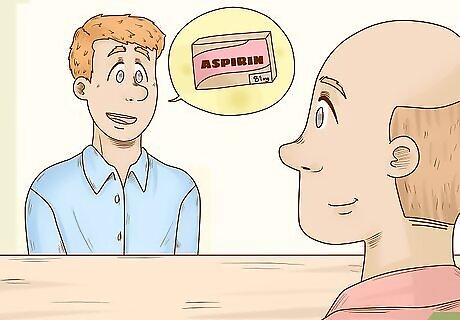
Discuss taking Baby Aspirin with your doctor before you take it. It’s no longer recommended that people take baby aspirin as a preventative measure. Instead, adults between the ages of 40 and 70 who are not at an increased risk of bleeding and who have a confirmed cardiovascular disease, such as a previous heart attack, should only take baby aspirin if their doctor prescribes it. Do not take Baby Aspirin if you are over the age of 70. Do not take Baby Aspirin if you have an increased bleeding risk.
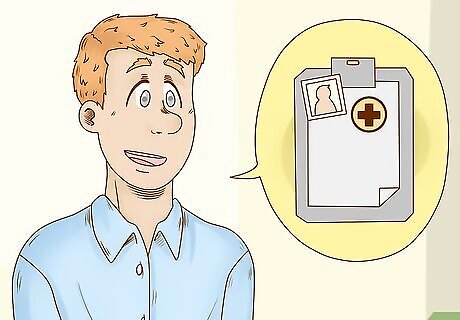
Speak to your doctor about your medical history. If you’ve ever had heart problems, ulcers, anemia, liver disease, kidney disease, or a bleeding disorder like hemophilia, talk to your doctor about these conditions before taking Baby Aspirin. Taking Baby Aspirin if you have these conditions may increase the chance of experiencing side effects or worsen the condition. Baby Aspirin can negatively affect the mucus lining of your stomach, so even if your ulcers have healed, taking it may not be a good idea. Baby Aspirin can be hard on your liver, especially if it’s already compromised, so be sure to mention any history of liver problems or alcoholism.Warning: If you already have bleeding problems (like hemophilia), avoid taking Baby Aspirin because it will reduce the stickiness of your blood cells even more and exacerbate the condition.

Tell your doctor about any vitamins or prescriptions you currently take. Baby Aspirin can interact with certain drugs, either decreasing the drug’s effectiveness or increasing the risk of side effects like gastrointestinal issues and ulcers. Talk to your doctor so you can determine whether or not Baby Aspirin is a good choice for you. Baby Aspirin interacts with the following drugs (note that this isn’t an exhaustive list): ACE inhibitors: benazepril (Lotensin), captopril (Capoten), enalapril (Vasotec), fosinopril (Monopril), lisinopril (Prinivil and Zestril), moexipril (Univasc), perindopril, (Aceon), quinapril (Accupril), ramipril (Altace), and trandolapril (Mavik). Anticoagulants: heparin and warfarin (Coumadin). Beta-blockers: atenolol (Tenormin), labetalol (Normodyne), metoprolol (Lopressor, Toprol XL), nadolol (Corgard), and propranolol (Inderal). Medications for diabetes or arthritis. Gout medications: probenecid and sulfinpyrazone (Anturane) Drugs containing methotrexate: Xatmep, Trexall, Otrexup PF. Other NSAIDs: naproxen (Aleve, Naprosyn), ibuprofen (Motrin, Advil), and celecoxib (Celebrex).

Get clearance from your OB-GYN before taking Baby Aspirin if you're pregnant. Taking Baby Aspirin while you're pregnant is generally not recommended. However, if you've had miscarriages, preeclampsia (high blood pressure and liver or kidney damage), or clotting disorders, your doctor may prescribe Baby Aspirin to lessen the risk of birth complications. Don’t take Baby Aspirin while you’re pregnant unless your doctor specifically tells you to do so. The most common dose taken during pregnancy is 81 mg, but your doctor may recommend more or less depending on your condition. Preeclampsia can cause low birth weight and premature birth. Avoid taking anything higher than 100 mg of Baby Aspirin while you’re pregnant because taking high doses have been linked to birth defects. Similarly, avoid taking any amount during the last few months of pregnancy because doing so has also been linked to birth defects.
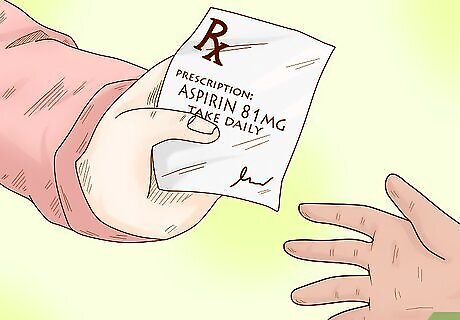
Get your doctor’s approval to take Baby Aspirin daily or as needed for pain. Don’t take Baby Aspirin until your doctor has told you to. Your doctor may tell you to take it daily as a preventative measure against stroke or heart attack or they may suggest you only take it for pain. Baby Aspirin is used to treat the following conditions: Mild fevers and associated symptoms (like headache and body aches). Upper respiratory infections and associated symptoms (like a sore throat or chest pain from coughing). Toothaches. Common cold. Muscle aches. Pain and swelling due to arthritis.
Taking Baby Aspirin
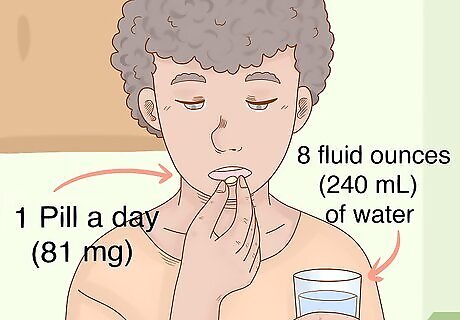
Swallow 1 pill (81 mg) a day with 8 fluid ounces (240 mL) of water. If you have coated tablets, take 1 pill (81 mg) of Baby Aspirin every day and wash it down with 8 fluid ounces (240 mL) of water. Chewable tablets can be chewed and then washed down with water. Double-check the instructions on the package to see if you have hard-coated or chewable Baby Aspirin.
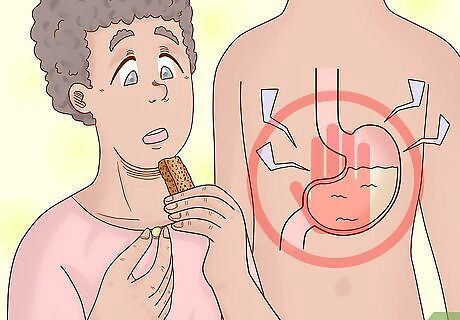
Eat a snack or meal with baby aspirin to prevent stomach irritation. If you have a sensitive or upset stomach, take Baby Aspirin with food or a glass of milk. This will help to coat your stomach and reduce the risk of irritation. Let your doctor know if Baby Aspirin still irritates your stomach even when taking it with food. Tip: Try keeping a couple packets of saltines or a granola bar on you at all times just in case you need to take Baby Aspirin on the go.
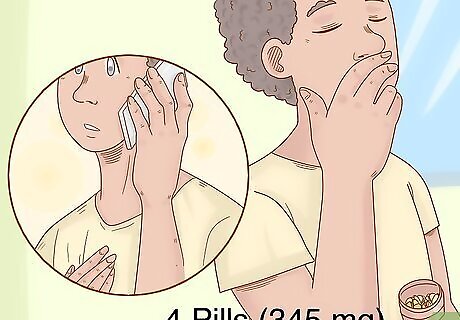
Call for help and chew 4 pills (325 mg) of Baby Aspirin if you’re having a heart attack. If you think you're having (or about to have) a heart attack, call for emergency medical care first. Then chew 4 81-mg tablets of Baby Aspirin and wash it down with 4 fluid ounces (120 mL) of water. A heart attack is caused by blood clots in your arteries and Baby Aspirin will help dissipate as much of the clot as possible until medical help arrives. Symptoms of a heart attack include: Intense chest pain (squeezing, heaviness, or pressing feeling) at the center or left part of your chest (usually lasting for 20 minutes or longer). Radiating pain in your upper left arm, jaw, or neck. Heavy sweating. Feeling of impending doom.



















Comments
0 comment